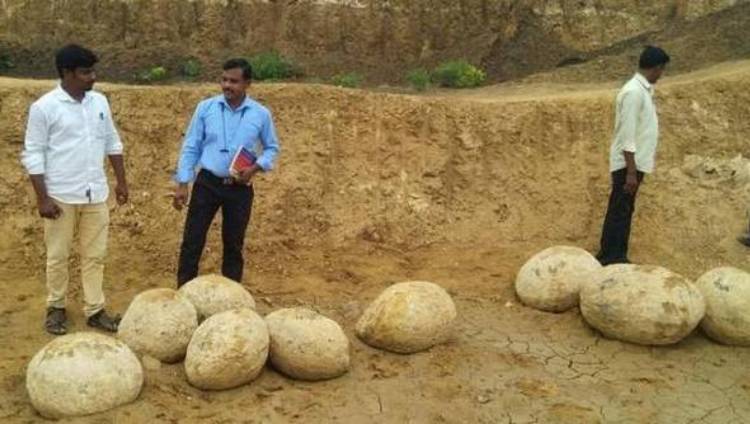'Dinosaur eggs' found in Tamil Nadu

After photos of the 'dinosaur eggs' found in Perambalur, Tamil Nadi started doing rounds on social media, a group of local archeology and geology enthusiasts confirmed that the structures are actually ammonite sediments.The spherical objects were found in an irrigation tank in Kunnam town in Perambalur district. The sediments were recovered from a tank being desilted in Kunnam, which were being claimed as dinosaur eggs on social media.A group of three archeology and geology enthusiasts, Ramesh Karuppiah, A Anandhraj and A Prabhudeva, visited the site.
They spotted a fossil tree measuring 7 feet in length. They estimated the actual length of the tree to be about 20 feet, however, the rest of the portion was washed away as there were imprints of fossil deposits."We have also identified ammonite sediments in Kunnam tank. Ammonite must have been trapped in the process of concretion for several million years, but it was often misconceived as dinosaur egg.Ammonites were large and diverse marine species that arose during the Devonian period, around 416 million years ago.In another incident, about 20-25 spherical objects were found by locals in Venkatan tank while desilting it on Wednesday. These structures were also claimed to be dinosaur eggs."Looking at the alignment of the objects, they cannot be dinosaur eggs. Also, eggs cannot be in such a vast size. The objects could have been formed due to concretion," a department professor said.Earlier, a 13-million-year-old fossil of a newly discovered ape species was unearthed in Uttarakhand.
Ammonite is a marine organism that existed centuries ago and the coating with sediments and minerals makes it into a rock-like object, C. Sivakumar, Curator (in-charge), Government Museum, Tiruchi, who carried out an inspection on October 23 following a direction from the Commissioner of Museums, Chennai, said.Mr. Sivakumar was accompanied by Uma Shankar, Curator (in-charge) Ariyalur Fossils Site Museum and Kunnam Tahsildar during the inspection.During the course of the inspection, stone ball-like objects of varying sizes were found in the tank. The objects were found when dredging works were being undertaken in the sprawling waterbody. The objects were mild yellow in color and found at a depth of 20-feet from the ground, said Mr. Sivakumar.Mr. Sivakumar said close examination of the upper portion of the objects at the site revealed they were all concretions that could have been formed centuries ago. Inspection of the upper layer of three big-size concretions that were flat, indicated that they were ammonites. Mr. Sivakumar said he had forwarded the inspection report with his observations to the Commissioner of Museums.
If you liked this post, I’d be very grateful if you’d help it spread by emailing it to a friend or sharing it on Twitter or Facebook. Do not forget to like us on Facebook and follow us on Instagram. Send your entries too…
Thank You
Riya Krishna


























Comments (0)